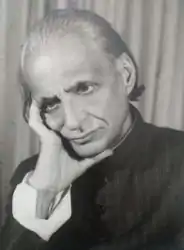Rais Amrohvi رئیس امروہوی | |
|---|---|
 | |
| Born | Syed Muhammad Mehdi 12 September 1914 Amroha, British India. |
| Died | 22 September 1988 (aged 74) Karachi |
| Nationality | Pakistani |
| Occupation(s) | Poet, journalist, parapsychologist |
Rais Amrohvi (Urdu: رئیس امروہوی), whose real name was Syed Muhammad Mehdi (1914-1988) was a Pakistani scholar, Urdu poet, paranormal investigator, and psychoanalyst and elder brother of Jaun Elia. He was known for his style of qatanigari (quatrain writing). He wrote quatrains for Pakistani newspaper Jang for several decade. He promoted the Urdu language and supported the Urdu-speaking people of Pakistan.[1] His family is regarded as a family of poets.[2]
The Sindh Assembly passed The Sind Teaching, Promotion and Use of Sindhi Language Bill, 1972 that created conflict and language violence in the regime of Prime Minister Zulfikar Ali Bhutto, he wrote his famous poem Urdu ka janaza hai zara dhoom say niklay (It is the funeral of Urdu, carry it out with fanfare).[3][4] He also intended to translate the Bhagavad Gita into standard Urdu.[5]
Early life
Amrohvi was born on 12 September 1914 in Amroha, India.[6] He migrated to Pakistan on 19 October 1947 and settled in Karachi.[7] He was known for his style of Qatanigari (quatrain writing). For several decades he published quatrains for Pakistan's daily newspaper, Jang. He was also a supporter of the Urdu language and the Urdu-speaking people of Pakistan. He established an institution Raees Academy where writers were trained in emotional and moral values.[1]
He also published a number of books on the topic of metaphysics, meditation, and yoga.[8] He was assassinated by virtue of his faith on 22 September 1988 by an extremist religious militant group.[9][10]
Publications
Poetry
- Alif
- Masnavi Lala-e-Sehra (1956)[11]
- Pase Ghubar (1969)[11]
- Qattat - I (1969)[11]
- Qattat - II (1969)[11]
- Hikayaat (1975)
- Ba-Hazrat-e-Yazdaan (1984)[11]
- Malboos-e-Bahar (1983)[11]
- Aasaar (1985)[11]
- Kulliyat[11]
- Naseemus sahar[11]
- Zameer e khama[11]
Other
- Muraqabah
- Ma'badun-Nafsiyaat (Parapsychology)
- Nafseyaat-o-Mabaad-an-Nafseyaat (3 vols)[11]
- Ajaib-e-Nafs (4 vols)
- Le Sans Bhi Ahista (2 vols)[11]
- Jinseyaat (2 vols)[11]
- Aalam-e-Barzagh (2 vols)[11]
- Hazraat-e-Arwah
- Hypnotism
- "Tawajjuhaat" (2 volumes)
- "Jinnaat" (2 volumes)[11]
- "Aalam-e-Arwah" (2 volumes)[11]
- Almiye e mashraqi Pakistan[11]
- Achche Mirza[11]
- Ana minal husain
See also
External Links
References
- 1 2 "Rais Amrohvi's 24TH Death Anniversary Today". Pakistan Observer.net. 12 September 2012. Retrieved 10 September 2014.
- ↑ "27th death anniversary of urdu poet Rais Amrohvi observed". The Daily Mail International. 22 September 2015. Retrieved 12 September 2016.
- ↑ "Herald exclusive: Big brother is watching". Daily Dawn.com. 3 September 2014. Retrieved 10 September 2014.
- ↑ Ayres, Alyssa (23 July 2009). Speakin Like a State-page.53. Cambridge University Press. ISBN 9780521519311. Retrieved 10 September 2014 – via Google Books.
- ↑ "Renowned poet Rais Amrohvi's death anniversary today". Samaa.tv. 22 September 2011. Retrieved 10 September 2014.
- ↑ Web Admin. "RAIS AMROHVI 1914-1988". Amroha.co.India. Retrieved 11 September 2016.
- ↑ Dr. Rauf Parekh (18 September 2011). "Raees Amrohvi's qatas : signposting Pakistan's history". Daily Dawn. Retrieved 11 September 2016.
- ↑ Parvez Jabri (22 September 2015). "27th Death Anniversary of Urdu Poet Rai Amrohvi observed". Business Recorder. Retrieved 12 September 2016.
- ↑ Web Admin. "Biography of Rais Amrohvi". Bihar Urdu Youth Forum. Retrieved 12 September 2016.
- ↑ Suleman Akhtar (12 March 2012). "Shia killing: Identified, offloaded and shot". Express Tribune. Retrieved 12 September 2016.
- 1 2 3 4 5 6 7 8 9 10 11 12 13 14 15 16 17 18 "Global Urdu Bio Encyclopedia". Bio-Bibliography.com. Retrieved 10 September 2014.